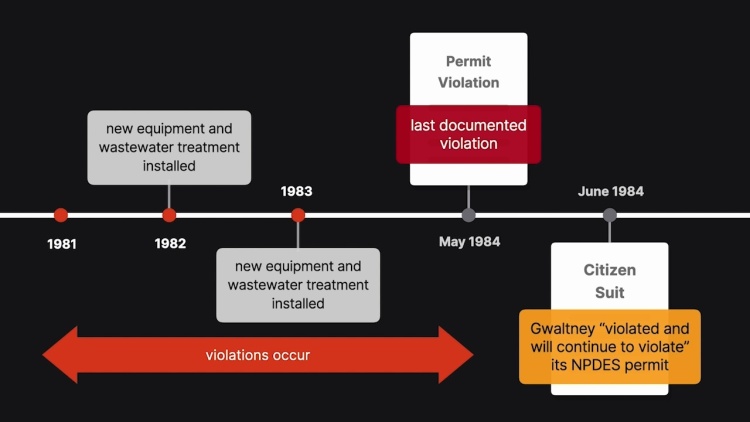Gwaltney of Smithfield, Ltd. v. Chesapeake Bay Foundation, Inc.
United States Supreme Court
484 U.S. 49 (1987)
- Written by Craig Conway, LLM
Facts
Chesapeake Bay Foundation, Inc. and Natural Resources Defense Council (plaintiffs) filed suit in federal court against Gwaltney of Smithfield, Ltd. (defendant), seeking declaratory and injunctive relief and alleging that the company had violated, and continued to violate, its Virginia State Pollutant Discharge Elimination System (SPDES) permit by exceeding effluent limitations on five of the seven pollutants covered by the permit in violation of the Clean Water Act (CWA). Specifically, plaintiffs claimed Gwaltney’s meat-packing plant discharged excessive amounts of fecal coliform, chlorine, and total Kjeldahl nitrogen (TKN) into the Pagan River. The district court granted partial summary judgment in favor of plaintiffs and held that Gwaltney had violated, and continued to be in violation of, the CWA. Before the district court reached a decision regarding an appropriate penalty, Gwaltney filed a motion for dismissal of the complaint on the ground § 505(a) of the CWA required a defendant to be in violation of the CWA at the time the suit was filed and because the last recorded violation occurred several weeks before plaintiffs filed the complaint, Gwaltney claimed the court lacked jurisdiction over the matter. The district court disagreed and held for plaintiffs. The court of appeals affirmed. Gwaltney appealed. The U.S. Supreme Court granted certiorari to review.
Rule of Law
Issue
Holding and Reasoning (Marshall, J.)
What to do next…
Here's why 907,000 law students have relied on our case briefs:
- Written by law professors and practitioners, not other law students. 47,100 briefs, keyed to 996 casebooks. Top-notch customer support.
- The right amount of information, includes the facts, issues, rule of law, holding and reasoning, and any concurrences and dissents.
- Access in your classes, works on your mobile and tablet. Massive library of related video lessons and high quality multiple-choice questions.
- Easy to use, uniform format for every case brief. Written in plain English, not in legalese. Our briefs summarize and simplify; they don’t just repeat the court’s language.






